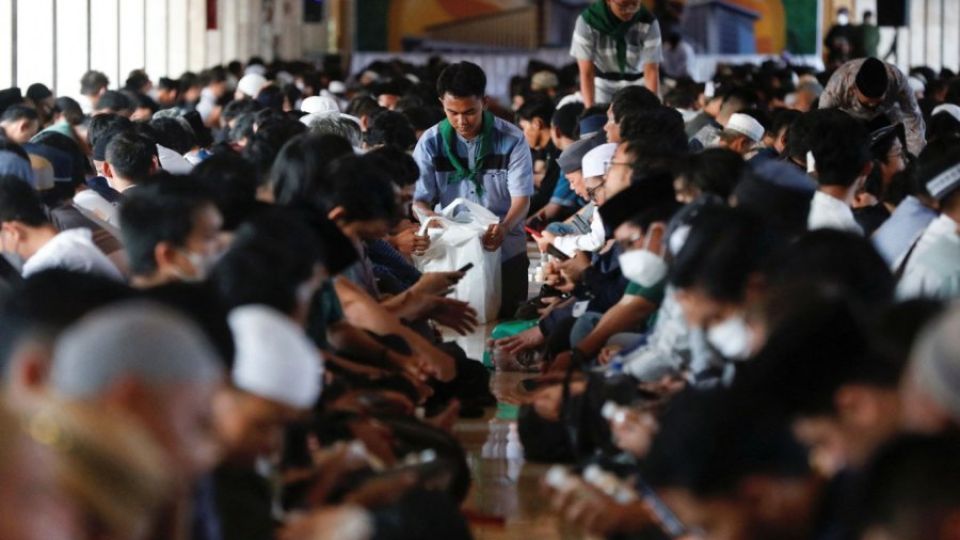March 24, 2023
JAKARTA – A presidential ban on iftar gatherings for civil servants during the holy month of Ramadan, on the pretext of preventing the spread of COVID-19 nearly three months after all pandemic curbs were lifted, has sparked backlash from several Islamist political parties.
In a circular signed by Cabinet Secretary Pramono Anung, President Joko “Jokowi” Widodo said COVID-19 in Indonesia was transitioning from a pandemic to an endemic, and caution was therefore needed to facilitate this.
“The Home Affairs Minister is expected to forward this instruction to governors, regents and mayors,” said the circular dated March 21, a copy of which went viral on Thursday.
The policy has drawn criticism from Islamic groups, which have accused the President of bias against the Muslim community. Some have pointed out that the pandemic curbs were gradually eased until they were fully lifted at the end of December, and that bans no longer applied to crowd-drawing events, such as concerts, exhibitions and even big weddings, including that of the President’s son.
Read also: Ban on civil servants hosting iftar could backfire on Jokowi: Yusril
‘Unwise, unfair’
Yursril Ihza Mahendra, the leader of the Crescent Start Party (PBB), a small pro-government Islamist party, has called on the Cabinet Secretariat to revise the circular and allow civil servants to hold iftar gatherings.
“I am concerned that the policy will be used as a pretext to discredit the government and accuse the Jokowi administration of being anti-Islam,” he said in a statement on Thursday.
The circular was merely a policy and was not based on a particular law, Yusril stated, so it could easily be revised after evaluating its merits.
Din Syamsuddin, the chairman of the Pelita Party, also blasted the policy, calling it “unwise” and “unfair”.
“It is unwise because it is as if it does not understand the meaning and purpose of an iftar [meal], which [includes] strengthening friendships, which could actually improve the performance of civil servants,” said Din, a former chairman of Muhammadiyah, the country’s second largest Muslim organization.
“It is unfair because its rationale is made up, citing the danger of COVID-19. Did the President break his own rules by holding a big wedding and creating a crowd? Hasn’t the President himself been in a crowd recently?”
Din also lamented that the policy was issued just as Muslims started fasting and were preparing to hold iftar gatherings.
Ramadan began on the evening of March 22.
Read also: In Ramadan, let’s focus on solidarity with future generations
Not a blanket ban
Islamist parties in the ruling coalition are divided over the policy.
The United Development Party (PPP) said using the pandemic as a reason to ban iftar gatherings was incorrect.
“The circular should not be seen as an attempt to ban events involving the Muslim community,” PPP executive Achmad Baidowi said in a statement. “We are hoping that iftar [events] will not be banned.”
Meanwhile, the National Mandate Party (PAN) has defended the policy, saying it was not meant to discriminate against the Muslim community.
“President Jokowi is banning officials from the central to the regional governments from holding iftar gatherings. This is not a blanket ban on iftar gatherings held by the public,” said PAN secretary-general Eddy Suparno.
“Don’t make it [out] as if the people are banned from holding iftar gatherings,” he emphasized.
In a futile attempt to defuse anger over the policy, the Health Ministry clarified that members of the public could still hold iftar gatherings during Ramadan or open houses during Idul Fitri, stressing that the ban only applied to government officials.
It remains unclear why the government believes that banning officials from holding iftar gatherings while allowing the public to do so would be effective in preventing the spread of COVID-19.
Read also: Peace and unity, not identity politics, as ‘core’ Ramadan principles
‘Makes no sense’
Pandu Riono, an epidemiologist from the University of Indonesia, said there was no reason to impose any restrictions on public activities, such as iftar gatherings or concerts, after the public activity restrictions (PPKM) was lifted last year.
“As an epidemiologist I disagree, as it is not a rational policy,” he said.
He suspected that the President was possibly trying to stop officials from flaunting their wealth during Ramadan, given that many had been publicly exposed and shamed for showing off their lavish lifestyles on social media.
“This policy makes no sense if the transition from a pandemic to an endemic is used as its rationale,” Pandu added.
The government revoked the PPKM on Dec. 30, 2022. A related instruction issued by the Home Ministry on the same date contains provisions requiring regional administrations to take “proactive” and “persuasive” measures to prevent a COVID-19 surge as the country inches along in transitioning to an endemic.
Political blunder?
President Jokowi has long faced political challenges from Islamic groups associated with Salafism and harakah movements, such as the banned organization Hizbut Tahrir, as well as the hard-line Muhammadiyah faction that has repeatedly questioned his credentials as a Muslim leader.
The iftar policy has fueled anti-government sentiment among the Islamist opposition on social media.
It could also turn into a political blunder for the President, who has sought to influence the hunt for his successor by lobbying political parties over his preferred candidates for the 2024 presidential race.
Anies Baswedan, touted as the opposition’s potential contender, is largely popular among conservative and urban Muslims. In the 2017 gubernatorial election, Anies was seen to ride the wave of Islamic conservatism win the capital’s top job.
“There should not be a double standard,” said Ujang Komarudin, a political observer from Al-Azhar University of Indonesia.
“Conservative Muslims and even other Muslim groups will be disappointed and will no longer trust Jokowi.” (ahw)


